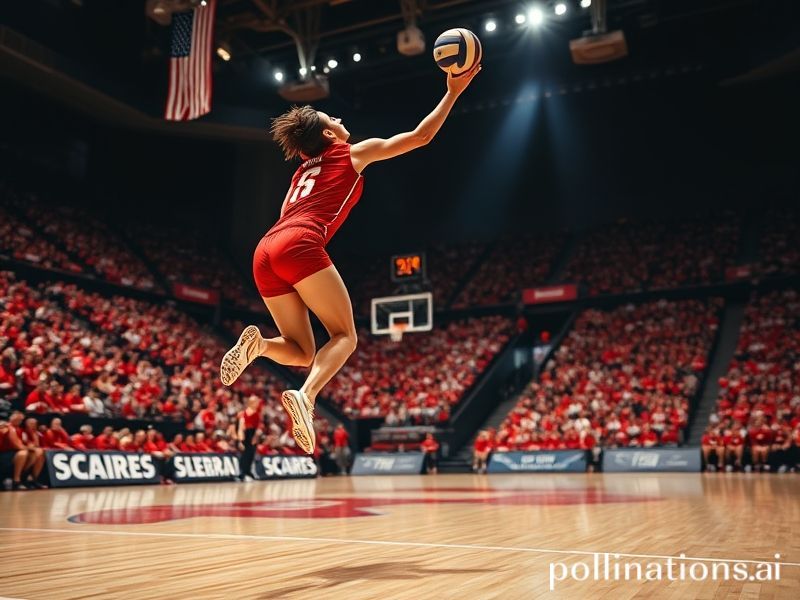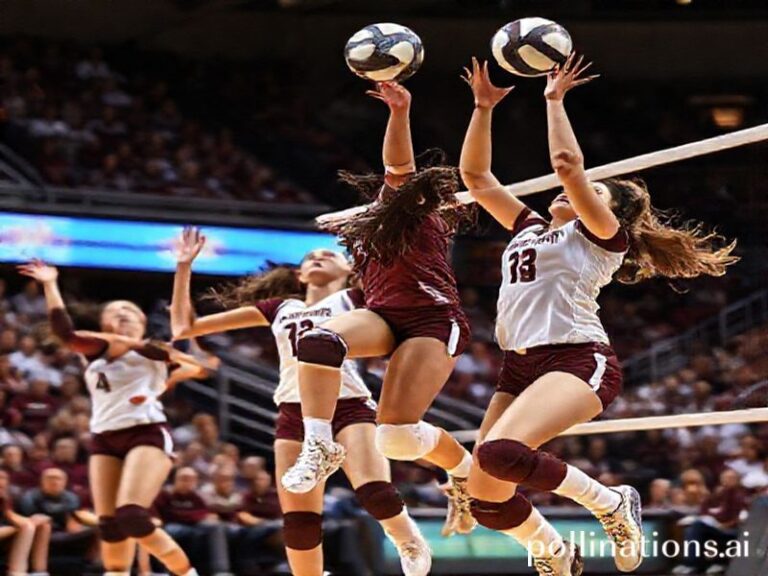Nebraska Volleyball: America’s Accidental Diplomatic Weapon in a World Gone Mad
Volleyball Is Nebraska’s Only Working Export Program, and It May Just Save the World
LINCOLN, Nebraska—While global supply chains wheeze like asthmatic accordion players and diplomats argue over whose sanctions hurt more, the University of Nebraska’s volleyball program is quietly running the most efficient export operation the United States has managed since Boeing mislaid its bolts. Every August, 90,000-plus pilgrims—roughly the population of Reykjavík—descend on Memorial Stadium to watch women swat a synthetic sphere at supersonic speeds. Last year they set the world attendance record for any women’s sporting event, a statistic that now appears in CIA briefings under the heading “Soft Power We Didn’t Have to Pay For.”
From the outside, this looks like charming provincial pageantry: corn-fed collegians in scarlet and cream performing for locals who still believe “flyover country” is a conspiracy invented by coastal cartographers. Yet the implications ripple outward like a well-placed topspin serve. Consider: when European leagues poach Nebraska’s outside hitters, they receive not merely athletes but fully formed missionaries of Midwestern punctuality, an ethos rarer on the continent than sober British finance ministers. Meanwhile, Asian scouts download match footage the way hedge-fund quants scrape satellite imagery of Walmart parking lots; they’re not scouting talent so much as reverse-engineering whatever mystical biomechanics allow 6’4″ Nebraskans to pass a ball with the accuracy of Swiss watchmakers on amphetamines.
The United Nations, ever eager to slap a sustainable-development label on anything that moves, has begun sending volleyball coaches to refugee camps under the logic that a well-timed set is cheaper than trauma therapy and marginally more effective than PowerPoint. Somewhere in northern Jordan, a former Husker assistant is teaching Syrian teenagers the “Go Big Red” chant, which locals have repurposed into a rhythmic protest against electricity cuts. Soft power, meet hard serve.
Back home, Nebraska’s economy has long relied on two volatile commodities: corn and whatever hallucination Wall Street has about corn futures. Volleyball offers a third pillar—merchandise sales, tourism, and the lucrative streaming rights now fought over by Amazon, Alibaba, and a surprisingly tenacious Estonian start-up that claims its platform can translate John Cook’s sideline tantrums into fourteen languages in real time. Last season’s TV audience peaked at 1.8 million viewers in Brazil alone, a country that traditionally prefers its balls attached to feet. Analysts credit the spike to the novelty of watching an American crowd that doesn’t set fire to the city afterward.
Of course, nothing this wholesome escapes the gravitational pull of late-stage capitalism. Tickets for the upcoming “Volleyball Day in Nebraska” now trade on secondary markets at prices that would make Champions League scalpers blush. A single seat behind the end line costs roughly one week’s wages for the stadium’s custodial staff, creating the sort of inequality Americans usually reserve for pharmaceutical pricing. The athletic department, displaying the moral clarity of a casino owner at a Gamblers Anonymous meeting, counters that proceeds fund scholarships—though the scholarships, conveniently, go to players who generate the proceeds, a circular argument M.C. Escher would applaud.
Still, cynicism only stretches so far when confronted with 90,000 synchronized claps echoing across the prairie like a mass recalibration of human decency. In a year when half the planet seems one tweet away from thermonuclear karaoke, the sight of a perfectly executed slide attack offers a rare commodity: competence. If Nebraska can export that—wrapped in a red foam finger and shipped via whatever FedEx hasn’t misplaced—perhaps the world will discover that salvation doesn’t require a G7 summit, just a 3-2 rotation and the humility to admit someone from a flyover state might be better at something.
Until then, the Huskers will keep serving, spiking, and selling hope in convenient 25-point increments. The rest of us will keep watching, because hope, like Nebraska corn, is a subsidized commodity, and the global economy runs on whatever we can grow.







